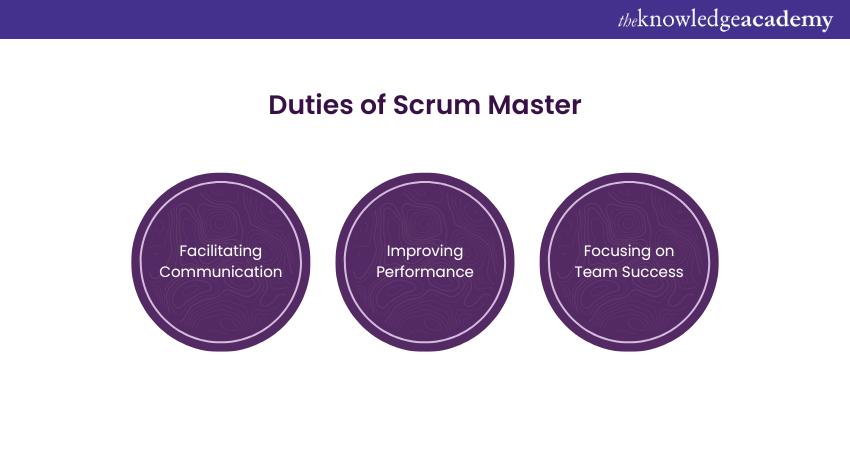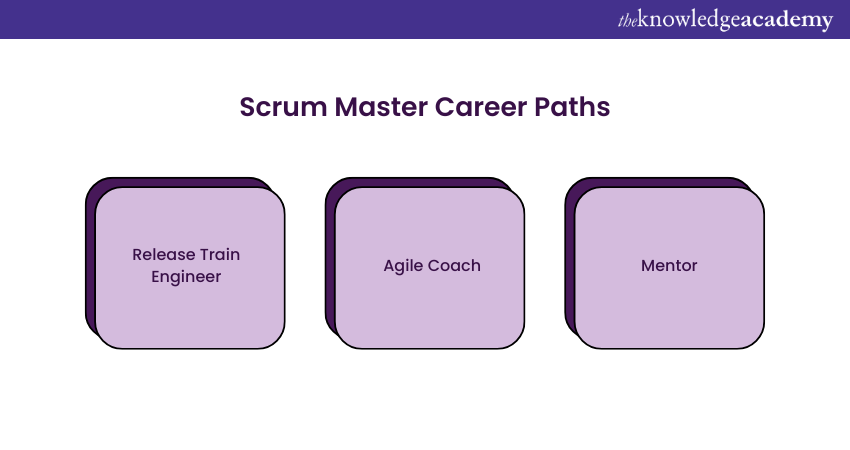We may not have the course you’re looking for. If you enquire or give us a call on +48 221041849 and speak to our training experts, we may still be able to help with your training requirements.
We ensure quality, budget-alignment, and timely delivery by our expert instructors.

Software development is a demanding job that requires a significant amount of time and effort. Since the introduction of Scrum methodologies, the process of developing software has been greatly simplified. In this blog, you will learn who Scrum Masters are, their responsibilities, their career paths, and the different types of job roles associated with Scrum Masters.
Additionally, Scrum Masters play a crucial role in Scrum teams, as they are involved in various aspects of the process. There is a high demand for Scrum Masters, and a career as a Scrum Master can be very rewarding. Read on to understand Scrum Master Career Paths in detail.
More importantly, the best part is that you can easily transition to advanced roles, earn higher pay, and acquire more skills along the way. This blog covers who Scrum Masters are, their responsibilities, Scrum Master Career Paths, and related job roles.
Table of Contents
1) What is a Scrum Master?
2) Scrum Master Roles and Responsibilities
3) Scrum Master Career Paths
4) What are the different job roles?
5) What is the future of a Scrum Master?
6) Conclusion
Who is a Scrum Master?
A Scrum Master is an expert in the Agile framework, which is used for creating complex software projects. The Scrum Master is the heart of the Scrum team and is responsible for guiding the team with their expertise in Scrum. Nowadays, many organisations use Agile project management to manage their projects.
In Agile methodologies, the Software Development process is divided into shorter manageable phases called sprints. The Agile method is very useful for team collaboration as it encourages teamwork and coordination, making it widely used for many fast-moving projects.
Being a Scrum Master is a fascinating job with its own challenges. There is currently a high demand for Scrum Masters, and job openings for them can be found in every field. The Scrum Master is responsible for the performance of the Scrum team. Let’s discuss some of their duties are listed below:

1) Facilitating Communication: Creating an environment where team members can openly share ideas and feedback. This is supported by regular meetings and the use of collaborative tools.
2) Improving Performance: Identifying areas for growth and implementing strategies such as new training programs or technology enhancements.
3) Focusing on Team Success: Prioritising shared goals and celebrating collective achievements, which fosters a culture of collaboration.
Scrum Master Responsibilities
A Scrum Master follows Agile methodologies, and their roles and responsibilities are based on its framework. The primary role of a Scrum master is to use Agile methodologies to lead their team members on the project. The Roles and Responsibilities of a Scrum Master may vary across different industries; however, some common tasks are listed below:
1) Leading daily meetings or project meetings
2) Evaluating the team’s work
3) Providing support to team members and guiding them to ov ercome any issues
4) Mentoring the team on project management principles
5) Detecting problems and efficiently solving them
6) Promoting dialogue and teamwork
7) Monitoring and briefing on completed tasks
8) Setting and tracking project goals
9) Facilitating continuous improvement initiatives
Education and Certification Requirement for a Scrum Master
A bachelor’s degree and certifications are often preferred to become a Scrum Master. Let’s discuss it in detail:
Scrum Master Education
There are no strict educational requirements for the Scrum Master role. However, most companies prefer candidates with a bachelor’s degree in IT, business administration, or a related field. A college degree can also help in gaining the on-the-job expertise often sought in Scrum Master job listings.
Scrum Master Certification
Obtaining a recognised industry certification is a fantastic way to showcase your expertise in Scrum framework methodologies to potential employers. This can help you enhance your foundational knowledge and cultivate a learning mindset by investing in your personal growth.
One of the most popular certifications is the Scrum Master Certification. Additionally, you can explore various free online courses in Agile and Scrum to develop your skills and effectively lead teams.
Scrum Master Career Paths
One of the best aspects of being a Scrum Master is the variety of career paths available. With the experience you gain, you can easily transition to roles such as Product Owner, Project Manager, Chief Information Officer, and more.

1) Release Train Engineer
As an experienced Scrum Master, you can transition to a Release Train Engineer. This role involves managing tasks and events across various Scrum teams and regularly interacting with stakeholders. A Release Train Engineer works towards achieving the program’s goals by guiding multiple teams.
2) Agile Coach
Agile Coaches help team members understand the Scrum framework and facilitate the smooth implementation of Scrum methodologies. They also assist team members in overcoming work-related challenges. With your foundational knowledge as a Scrum Master, transitioning to an Agile Coach role can be seamless.
3) Mentor
A Mentor’s primary responsibility is to teach Scrum methodologies and provide emotional guidance to the team. This role requires extensive knowledge and experience as a Scrum Master.
Learn to manage your projects with our Managing Agile Projects with Scrum – Register now!
Job Opportunities for Scrum Master
Working as a Scrum Master will provide you with extensive knowledge of project management. As a result, you will naturally develop traits such as leadership and team management skills. With these skills, you can easily transition into different job roles. Let’s take a look at some of these roles along with their corresponding salaries.
1) Product Owner
Product Owners are responsible for making crucial decisions related to Project Management , such as budget control, product releases, and market understanding. Since Scrum Masters coordinate with Product Owners regularly, they often have a rough idea of the Product Owner's roles and responsibilities. Hence, it is not surprising that some Scrum Masters look to transition to become Product Owners.
Working as a Product Owner involves more responsibilities than a Scrum Master and comes with its own set of challenges. Before making a career switch as a Product Owner, it’s important to be prepared to handle these challenges. On the plus side, a Product Owner with experience in building projects as a Scrum Master is considered a rare gem. The average salaries of a Product Owner are listed below:
a) US: The average salary of a Product Owner in the United States is around $160,858 per year, including the additional pay as per Glassdoor.
b) India: The average salary of a Product Owner in India is around ₹22,00,000 per year, as per Glassdoor.
c) UK: The average salary of a Product Owner in the United Kingdom (UK) is around £57,937 per year as per Glassdoor.,
Unlock your team’s potential with our Scrum for Team Course – Register now!
2) Senior Scrum Master
The Senior Scrum Master is an advanced role compared to a Scrum Master and involves extensive collaboration with Product Owners. They are responsible for providing necessary resources to the team and selecting suitable user stories for backlogs. Additionally, they help their organisations achieve their business goals and lead their team in the right direction. The average salaries of a Senior Scrum Master are listed below:
a) US: The average salary of a Senior Scrum Master in the United States is around $183,093 per year, as per Glassdoor.
b) India: The average salary of a Senior Scrum Master in India is around ₹25,00,000 per year, as per AmbitionBox.
c) UK: The average salary of a Senior Scrum Master in the United Kingdom (UK) is around £72,212 per year, as per Glassdoor.
3) Project Manager
Project Managers are responsible for managing both the project and the project team. It is relatively easy for Scrum Masters to switch to the role of Project Manager as the work is quite similar. Project Managers are responsible for motivating the team to focus on the project’s goals and addressing any hurdles the team faces using their expertise. The average salaries of a Project Manager are listed below:
a) US: The average salary of a Project Manager in the United States is around $136,146 per year, as per Glassdoor.
b) India: The average salary of a Project Manager in India is around ₹16,50,000 per year, as per Glassdoor.
c) UK: The average salary of a Project Manager in the United Kingdom (UK) is around £49,056 per year, as per Glassdoor.
4) Chief Information Officer (CIO)
Chief Information Officers are responsible for driving the business value of an organisation through the use of technology. They also create and oversee the implementation of Information Technology (IT) policies. This role heavily involves technology, and having a technical background can be beneficial for success in this position.
If you are considering switching your career from a Scrum Master to a CIO, keep in mind that you may need to acquire some technical knowledge. The average salaries of CIOs in different countries are listed below:
a) US: The average salary of a Chief Information Officer in the United States is around $382,404 , as per Glassdoor.
b) India: The average salary of a Chief Information Officer in India is around ₹74,90,000 per year, as per AmbitionBox.
c) UK: The average salary of a Chief Information Officer in the United Kingdom (UK) is around £177,954 per year, as per Glassdoor.
Conclusion
Being a Scrum Master involves facing challenges and receiving rewards, as it is a dynamic job that leads to project success and promotes team collaboration. As the need for Agile methodologies grows, Scrum Masters can have a major influence in different industries. Taking on this responsibility involves advocating for effectiveness and creativity, making it a satisfying option for individuals who are enthusiastic about Agile methodologies and group interactions.
Learn Scrum Master techniques with our Scrum Master Certification – Join now!
Frequently Asked Questions
Is Being a Scrum Master a Good Career?

Working as a Scrum Master offers a fulfilling profession with chances to lead agile teams, enhance project results, and boost organisational productivity. It is perfect for individuals who appreciate working together, solving problems, and promoting ongoing enhancement.
Are Scrum Masters Still in Demand?

Indeed, the need for Scrum Masters is increasing as more businesses implement Agile approaches. Their abilities in leading teams, aiding processes, and ensuring project accomplishment are essential for reaching corporate objectives.
What are the Other Resources and Offers Provided by The Knowledge Academy?

The Knowledge Academy takes global learning to new heights, offering over 30,000 online courses across 490+ locations in 220 countries. This expansive reach ensures accessibility and convenience for learners worldwide.
Alongside our diverse Online Course Catalogue, encompassing 19 major categories, we go the extra mile by providing a plethora of free educational Online Resources like News updates, Blogs, videos, webinars, and interview questions. Tailoring learning experiences further, professionals can maximise value with customisable Course Bundles of TKA.
What is The Knowledge Pass, and How Does it Work?

The Knowledge Academy’s Knowledge Pass, a prepaid voucher, adds another layer of flexibility, allowing course bookings over a 12-month period. Join us on a journey where education knows no bounds.
What are the Related Courses and Blogs Provided by The Knowledge Academy?

The Knowledge Academy offers various Scrum Certification, including the Scrum Master Certification, Agile And Scrum Awareness, and Scrum For Teams. These courses cater to different skill levels, providing comprehensive insights into Operations Management.
Our Project Management Blogs cover a range of topics related to Scrum, offering valuable resources, best practices, and industry insights. Whether you are a beginner or looking to advance your Project Management skills, The Knowledge Academy's diverse courses and informative blogs have got you covered.
Upcoming Project Management Resources Batches & Dates
Date
 Scrum Master Certification
Scrum Master Certification
Thu 6th Feb 2025
Thu 13th Feb 2025
Thu 20th Feb 2025
Thu 27th Feb 2025
Thu 6th Mar 2025
Thu 13th Mar 2025
Thu 20th Mar 2025
Thu 27th Mar 2025
Thu 3rd Apr 2025
Thu 1st May 2025
Thu 22nd May 2025
Thu 5th Jun 2025
Thu 19th Jun 2025
Thu 3rd Jul 2025
Thu 17th Jul 2025
Thu 31st Jul 2025
Thu 14th Aug 2025
Thu 11th Sep 2025
Thu 25th Sep 2025
Thu 2nd Oct 2025
Thu 9th Oct 2025
Thu 16th Oct 2025
Thu 23rd Oct 2025
Thu 30th Oct 2025
Thu 6th Nov 2025
Thu 13th Nov 2025
Thu 20th Nov 2025
Thu 27th Nov 2025
Thu 4th Dec 2025
Thu 11th Dec 2025
Thu 18th Dec 2025






 Top Rated Course
Top Rated Course



 If you wish to make any changes to your course, please
If you wish to make any changes to your course, please


